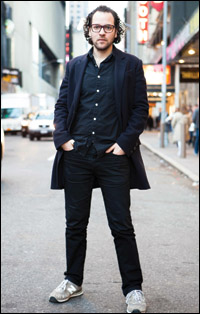
Thanks to numerous theatre histories and biographies, as well as the 1999 Tim Robbins film "Cradle Will Rock," most theatregoers are familiar with that dramatic backstory. Ironically, however, few actually know the show itself, or its score.
Jeanine Tesori intends to correct that situation July 10-13, when she presents the musical as part of the inaugural season of New York City Center's new Encores! Off-Center series, which, unlike the regular Encores!, will focus on musical work that was not produced on Broadway.
"I love that piece and have never been able to see it," said Tesori, who is artistic director of Encores! Off-Center.
Tesori said that she felt the invitation to direct the new Encores! series afforded her the opportunity to program shows she (and, hopefully others) had never seen, but had always wanted to.
The Cradle Will Rock has a long history with City Center, having been performed there in 1947 and 1960. The latter production was conducted by Leonard Bernstein. Unlike some musicals of the past, the score of The Cradle Will Rock was not difficult to reconstruct.
"It was fairly easy," said Chris Fenwick, musical director of Encores! Off-Center. "There is an existing piano-conductor score that Leonard Bernstein used when he did it at City Center in 1960. And we did have our hands on the original Blitzstein parts. We got a chance to look at those parts and use those parts and figure out stylistically what he was really going for.
"Sometimes scores can be a real mess," he continued. "Amazingly on this one, with its tumultuous history, they were pretty easy to work with."
Blitzstein originally orchestrated the score for 30 musicians, but it has rarely, if ever, been played by such a large group. For the Encores! staging, an orchestra of 14 will be used.
"The score is so varied, and has so many styles and textures and colors and ideas, that having more musicians is a real gift," said Fenwick.
For the director of this production, Tesori drafted Sam Gold, with whom she in engaged in many political discussions, and whose production of The Threepenny Opera she had seen. Gold did not need much convincing.
"It's the kind of project I had been really itching to do," he said.
 |
||
| Sam Gold |
"I don't think a lot of people know Blitzstein's work," echoed Tesori. "He was prolific. I've been delighted with my own discovery of this composer."
Set in Steeltown, USA, the politically charged, allegorical story wears its anti-capitalist allegiances on its sleeve. It follows Larry Foreman as he attempts to unionize the workers of the town, fighting an all-controlling businessman who goes by the name of Mr. Mister. It was written during the Depression, when many men were out of work, and labor unions had not only enoyed power, but public sympathy.
Seventy-six years later, a lot has changed in America. Labor unions have been severely weakened and bear a negative reputation with large segments of the public, while corporate CEOs are regarded by many Americans with admiration. Will a 2013 theatre audience have an appetite for Blitzstein's 1937 viewpoint?
The creators, frankly, do not know. "There's, I think, an interesting conversation to have about labor rights and disparity of wealth and wages and all sorts of things that we're talking about in our national conversation," said Gold. "This was a piece of agitprop theatre that was written about something that was in the papers. I'm interested in what the reaction will be in a show that engages in the national conversation at that level."
"What's going to be surprising" to the audience, opined Gold, "is that theatre can be overly political and ask the people who come to see it to affect direct change in their lives. That's something that we don't engage in much in the New York theatre community."
"The piece is a political discussion," said Tesori. "The politics of theatre is an interesting one, because, to me, it's about being part of the conversation. I think the show reveals the complicated questions of how art and commerce come together, how accumulated wealth is used, how it's unevenly distributed in this country to a degree that I don't understand."
"I'm not even going to guess," about the audience reaction, continued Tesori. "I don't know. I'm so interested in the piece, so invested in the artists who are doing it. That's been compelling to me."










